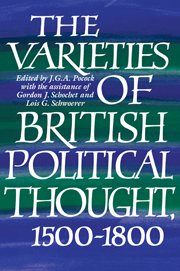Book contents
- Frontmatter
- Contents
- Acknowledgements
- Editorial introduction
- Part I Church, court and counsel
- Part II Dissolution, restoration and revolution
- Part III Commerce, empire and history
- 7 Politics and politeness in the reigns of Anne and the early Hanoverians
- 8 Political thought in the English-speaking Atlantic, 1760–1790: (i) The imperial crisis
- 9 Political thought in the English-speaking Atlantic, 1760–1790: (ii) Empire, revolution and an end of early modernity
- Epilogue
- Index
7 - Politics and politeness in the reigns of Anne and the early Hanoverians
Published online by Cambridge University Press: 04 August 2010
- Frontmatter
- Contents
- Acknowledgements
- Editorial introduction
- Part I Church, court and counsel
- Part II Dissolution, restoration and revolution
- Part III Commerce, empire and history
- 7 Politics and politeness in the reigns of Anne and the early Hanoverians
- 8 Political thought in the English-speaking Atlantic, 1760–1790: (i) The imperial crisis
- 9 Political thought in the English-speaking Atlantic, 1760–1790: (ii) Empire, revolution and an end of early modernity
- Epilogue
- Index
Summary
What Country soever in the Universe is to be understood by the Bee- Hive represented here, it is evident from what is said of the laws and Constitution of it, the Glory, Wealth, Power and Industry of its inhabitants, that it must be a large, rich and warlike Nation, that is happily govern'd by a limited Monarchy.
(B. Mandeville, The Fable of the Bees, Or Private Vices, Public Benefits, The Preface)The political thought of the reigns of Anne and of the first two Georges was an integral part of the political culture of a polity whose wealth was the product of a rapid if bumpy, expansion of overseas and domestic trade; whose power was derived from the wars of the reigns of William III and Anne and the massive extension of the fiscal and military power of the state that accompanied them, and whose civil and religious liberties were enshrined in ‘revolution principles’ whose meaning remained obscure and bitterly controversial. The Revolution, the Revolution Settlement, the Act of Settlement, and the Anglo-Scottish Union notwithstanding, the succession remained in question from the Revolution to the Forty-Five. Fundamental questions about the relationship of the monarch to parliament, parliament to people and the Church of England to a protestant nation deeply penetrated by dissent, remained unanswered and would continue to fracture the politics of a notoriously volatile political nation. For while it was an evident and, for some non-jurors, regrettable fact of political history that Britain had become a mixed monarchy, the question of whether the mixture was to be described in terms of the King's Answer to the Nineteen Propositions or in terms of contracts ancient or modern was profoundly controversial.
- Type
- Chapter
- Information
- The Varieties of British Political Thought, 1500–1800 , pp. 211 - 245Publisher: Cambridge University PressPrint publication year: 1994
- 6
- Cited by



